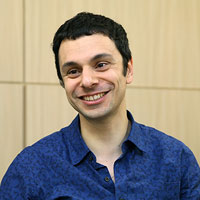View this article in another language
- 한국어
- English
- 日本語
- 中文
- العربية
- Español
- Français
- Deutsch
- Pусский
- Tiếng Việt
- Indonesian

Lunar New Year is celebrated in many Asian countries besides Korea, notably the likes of China and Vietnam, which will also welcome the Year of the Golden Pig on Feb. 5.
But for Westerners like me, the holiday really has no direct parallel. Christmas is the only major festival that bears any sort of resemblance, a family get-together with lots of food and several days off work. But even Yuletide in the West cannot quite prepare you for Korea’s biggest holiday.
Indeed, if you're not prepared for Seollal, Korea’s Lunar New Year, you can often find yourself missing out. Non-Koreans living in big cities run the risk of waking up the day before Seollal to find the streets eerily quiet and all their Korean friends suddenly out of town.
The reason? Seollal typically involves a countrywide exodus to familial homes. The house of the most senior living male relative (e.g., the oldest living firstborn son in the family) is known as the keun-jib – literally the "big house" – and this is where families usually flock to for gatherings.
Korean urbanization is a relatively recent phenomenon. Some 83 percent of Koreans now live in big cities, but only a few decades ago, the country’s population was mainly concentrated in smaller village communities and a clutch of semi-rural towns. Thus for many, the family home remains in the countryside, along with another common meeting spot: the ancestral tomb. The day before Seollal is usually spent at the tomb, clearing away ice and snow from burial mounds, tending to the site and performing sacred rites.
So come Seollal, the usually thronging streets of Seoul, Daegu, Incheon, Busan and other cities become relatively quiet. If you do wake up on the holiday’s eve asking yourself where everyone has gone, you’ll often find the answer on the highways, where bumper-to-bumper traffic is guaranteed on the roads leading away from major cities.
However, I personally love to walk Seoul's city streets during the Seollal holiday. The cold weather and the closure of most businesses combine to afford one the unique opportunity to take therapeutic strolls down sidewalks that are, at all other times, buzzing hives of activity. Construction vehicles, busy office blocks, taxis and street stalls all fall still, leaving you free to roam around commercial districts at a leisurely pace, admiring the architecture without the raucous jostle of the city around you.
But not all Koreans choose to spend their Seollal holidays with family. Many instead decide to use the time off work (usually at least three days) as an opportunity for international travel, taking a few days of paid leave on either side of the public holiday to afford themselves a longer break. Popular Seollal destinations include Southeast Asia, where many countries are in the midst of milder, dry seasons. Non-Koreans are also tempted to take overseas breaks at this time of year, but Korea’s airports are possibly at their busiest before and after Seollal and flight tickets are often relatively expensive.
If you're thinking of a Seollal staycation, there's no better time of the year to sit back and watch some TV. In the run-up to the holiday, television stations run special traffic bulletins, with journalists reporting live from the roadside near highway tollgates. Though they usually focus on mammoth traffic jams, I find something reassuringly festive about these reports; when they start airing, you know that Seollal is just hours away!
But there's much more to Seollal TV than traffic updates. Music and sports fans, in particular, are always in for a treat. As well as festive music concerts, TV channels often air contests featuring K-pop stars competing in basketball, wrestling, archery and soccer matches. And if you prefer watching real athletes in action, numerous high-profile bouts of ssireum (traditional Korean wrestling) are held during Seollal and aired on major networks.
Of course, none of these activities hold a candle to the quintessential experience of Korean Lunar New Year: taking part in a family's Seollal festivities. If you're lucky enough to receive an invitation to a Korean family's Seollal shindig this year, be sure to accept. Excited children buzz around delighted adults in search of monetary gifts, and the food and drink just keep on coming.
Nothing teaches you quite so much about Korea – or fills you with so much love for this country's culture – than finding yourself at the heart of a gourmet get-together on the most festive day of the year.
Tim Alper is a Seoul-based British writer and columnist who has lived in Korea since 2007.